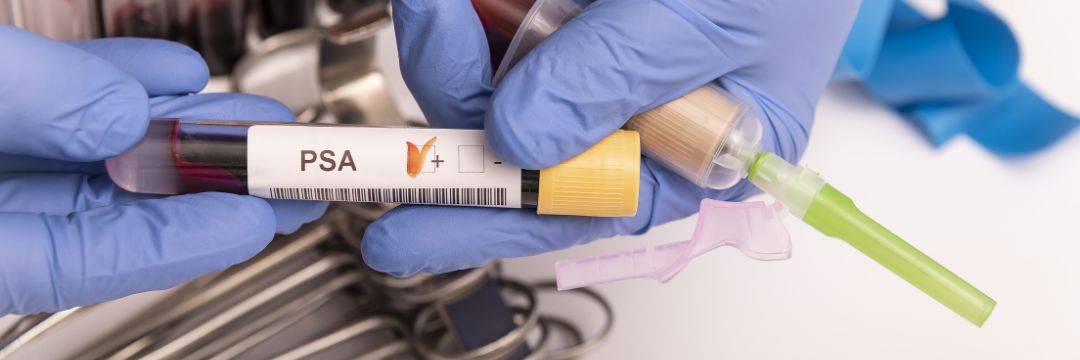
As men reach their 40s, their metabolisms may have started to slow, hair is thinning, and we must subject ourselves to the periodic prostate exam. Prostate cancer is one of the most treatable yet common cancers affecting men today. But we do have simple and accurate diagnostic tools to catch it early. When men experience a bacterial infection, an increased need to urinate and trouble going, dribbling following urination, blood in the urine, or a bladder obstruction with retention, there may be trouble in the prostate that should be checked out.
A Note on Symptoms: Urinary symptoms are rarely caused by prostate cancer. More often, these symptoms are due to a benign condition known as BPH or benign prostatic hyperplasia. BPH is treatable with in-office minimally invasive procedures, medications, or even outpatient surgical procedures, so don’t ignore the symptoms and get treated!
Prostate cancer is one of the most common types of cancer in men, and it’s also highly treatable if caught early. Several treatment options have proven successful in combatting prostate cancer, even in its advanced stage.
Early detection is crucial because it gives you more treatment options and a better chance of eliminating cancer. The prostate-specific antigen (PSA) test is used to check the PSA levels in your blood. These levels are different for every man – the indicator is whether the number is trending up compared to your prior PSA exam result.
Your doctor will perform a digital rectal exam (DRE) during your annual checkup to feel for any lumps or enlargement of your prostate. Let’s discuss how often you need a prostate exam and what you can expect.
Prostate Cancer Facts
Prostate cancer will affect one in every eight men at some point in their lives. The disease affects mainly older and African-American males. However, you are also at increased risk if a family member has been diagnosed with prostate cancer. Over 250,000 new cases of prostate cancer are diagnosed yearly, while nearly 35,000 men die of the disease. Approximately 60% of cases occur in men over 65 and older, with an average age of 66. Prostate cancer is the 2nd leading cause of cancer death in American males behind lung cancer. A serious disease like any cancer, the good news is that prostate cancer is not typically fatal, and the 5-year survival rate is nearly 100%, with the 10-year survival rate a staggering 98%. Sadly, if not caught in time and spreads to other body parts, the survival rate drops to around 30%.
Types of Prostate Exams
There are two universal prostate screening methods, the PSA and DRE. The PSA, or Prostate-Specific-Antigen test, measures the amount of PSA in a man’s blood. PSA is a protein produced by the prostate cells and constantly circulates through the blood.
The PSA has been controversial for misdiagnoses in the past, and the benefits of early detection must be weighed against false results. The test is highly sensitive and often detects a cancerous presence too small to be considered life-threatening. There is no standard PSA level. Some men with low levels have prostate cancer, while other men with high levels of PSA do not have cancer, hence the confusion over PSA test results. So, an upward trend in PSA readings over multiple tests suggests concern over the actual PSA level itself.
A digital rectal exam (DRE) is where your urologist inserts a gloved finger into your rectum to palpate (feel) your prostate and check for any lumps and other irregularities. This quick and painless test can tell a lot about a man’s prostate health.
How Often Is a Prostate Exam Necessary?
Your frequency of testing may be due to several factors, including your age, family history, and present health condition:
40–49 Years of Age: Most urologists recommend men aged 40 and above to undergo a prostate exam if they have a family history or personal history of prostate cancer. Also, African-American men should talk to their doctor about how often to have these tests performed because they are at a heightened risk. The PSA test is the gold standard for prostate screening, and your doctor may also perform a digital rectal exam (DRE).
Your test results will further determine how often you may need a prostate exam. Generally, if your PSA result is under 2.5, you will likely only need the test every two years. On the other hand, if the result is higher, your doctor will probably recommend an annual prostate exam.
If the number is beginning to increase, your physician will probably ask you to return within a matter of months to have a follow-up test because an increasing PSA could indicate the presence of cancer cells. You may also need a biopsy.
50 Years and Above: Men with an average prostate cancer risk start getting a PSA exam at age 50. At this age, your provider may recommend an annual PSA and DRE. Your doctor will guide you regarding future PSA tests because the frequency may change as you age.
If you have difficulty urinating, you may have an enlarged prostate called BPH (benign prostatic hyperplasia). This is not a cancerous condition, but it can interfere with proper urination and can be painful and aggravating – even interfering with a good night’s sleep. There are effective treatments for BPH that can significantly reduce your symptoms.
Steps to Lower the Risk of Prostate Cancer
While no way exists to prevent prostate cancer completely, dietary control, normal weight maintenance, and exercise can assist in lowering your risk. Eating a low-fat diet with plenty of fruits and vegetables while cutting down on dairy can help you reduce your risk factors. Exercising and keeping your weight within a normal range is critical as well.
Because prostate cancer is highly treatable, ensure that you lower the danger and have a regular prostate exam. See a doctor who knows the signs and aspects of prostate cancer, like Dr. Richard Natale.
Please don’t put off a simple exam that could reveal a very treatable illness before it has a chance to spread. Call Dr. Natale at (704) 786-5131 or request an appointment by clicking here.









